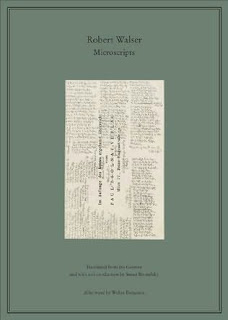Microscripts
By Robert Walser
New Directions
In theory, Robert Walser’s Microscripts is a selection of his later writings that have, by and large, not previously been available in English. And while Microscripts certainly does offer an interesting selection of his work, it also manages to do something else entirely: it presents visual reproductions (or what you and I call photographs) of some of the most unusual textual artefacts in European literature. To understand why this is the case, however, requires knowing a bit about Walser’s own life.
Although he wrote mainly in German, Walser was born in Switzerland in 1878. After a brief stint in the military, Walser attempted to make a go of a literary career; he succeeded in publishing four novels while living in Zurich and Berlin, but (like so many writers before and since) failed to earn a living from his art. Walser returned to Switzerland and became increasingly unstable. He eventually admitted to hearing voices and was diagnosed as suffering from schizophrenia, resulting in his institutionalisation in 1929. While he continued writing for another five years, by the mid-1930s he had stopped writing entirely. He lived in a psychiatric hospital for the rest of his life, and died of a heart attack while walking through the snow in 1956.
After his death, Walser’s literary executor, Carl Seelig, discovered 526 small, cut-up scraps of paper, all of which had tiny pencil-writing on them that appeared indecipherable. At the time, Seelig assumed that these texts were either written in some strange code, or else simply the result of Walser’s mental illness. But as scholars later discovered, these texts were actually written in an archaic form of shorthand called Kurrent; their illegibility was further magnified by the fact that the letters themselves were minuscule, often measuring only a millimetre in height. As a result of this extreme compression, Walser was able to write entire short stories on the backs of business cards and cut-up pieces of envelopes.
Indeed, Walser’s unusual compositional method was not simply a result of his madness, and it appears that he began composing in this way around 1917. His pencil writing was in fact a response to a crippling writer’s block; he found that the mechanical process of his miniscule writing (which he described as a ‘logically consistent, office-like copying system’) enabled him to attain the prose style he desired. As he notes in one of his letters, the microscript method ‘revived my writerly enthusiasm…I slowly, laboriously freed myself by means of the pencil.’
The Microscripts, published by New Directions, is a sort of archival record of these deeply unusual texts. The book offers beautiful, full-colour reproductions of many of the microscripts themselves, accompanied by both English translations and their German originals, as well as notes on their likely date and provenance. On a purely visual level, this is an undeniably beautiful book, which will appeal to anyone interested in art, design, typography, or the history of the book. But the main attraction, is, of course, Walser’s writing itself.
The texts within the microscripts are surely some of the most unusual pieces of writing in world literature. Walser’s short prose pieces are neither essay nor short story, and, in their elliptical, aphoristic quality, bear little resemblance to any codified genre of writing. But this, of course, is precisely their attraction. Walser’s prose constantly turns in completely unexpected directions, moving between absurd humour and sublimnity with ease. While they aren’t connected by linear narratives in the way that most readers would expect, they nonetheless contain their own logic. Their strangeness is precisely their value, since they force the reader to think about the very strangeness of language itself. One such microscript, for example, simply concludes by saying ‘This is certainly a peculiar story, and in any case it has never before appeared in print.’ Walser’s work is certainly unusual and most readers may find it strange, but, at the same time, his writing is not ‘difficult’ in the way that other modernist writers (like Joyce or Robert Musil) are; Walser’s writings are not obscure or full of literary allusion, but rather are written with an absolutely singular style. It’s also worth noting that many of these texts were produced before Walser’s stay in hospital, and they are not simply the products of madness, since they resemble his later writing.
For those interested in Walser’s late style, Microscripts, isn’t the best introduction (I would recommend, instead his novel The Robber, or else his Selected Writings), but they are an essential record of his writing – in every sense – and this book is an absolute treasure for anyone interested in more unusual modes of fiction.










